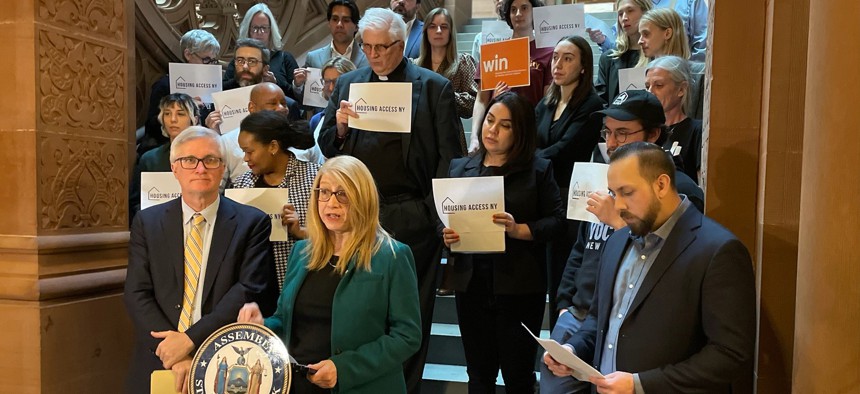Policy
Four-year pilot program for housing vouchers included in final state budget
The governor and Legislature had previously agreed to a two-year pilot for the Housing Access Voucher Program, but the final budget includes a four-year pilot program.

State Sen. Brian Kavanagh and Assembly Member Linda Rosenthal rally for the Housing Access Voucher Program in Albany. Austin C. Jefferson
The Housing Voucher Access Program is going to run as a four-year pilot program administered by the state Department of Housing and Community Renewal, New York City Housing Authority and city Department of Housing and Development, beginning on March 1, 2026 and ending on May 1, 2030.
State Sen. Brian Kavanagh and Assembly Member Linda Rosenthal, who chair their chambers’ respective housing committees and sponsored the HAVP bill, told City & State that it is their understanding that $50 million will be allocated for the program in this year’s budget will for the first year of the program, with the expectation that additional funds will need to be added in subsequent state budgets. The program will also have public reporting requirements intended to show how and whether the program is giving out vouchers, as well as various financial aspects of its operations.
Gov. Kathy Hochul surprised many when she announced that she would commit funding to the program after having shunned it for years as being too expensive. As recently as February, the governor was still saying that she believed the cost of the program was too high. But she said in late April that it became important to her.
“It's something I thought was important, the leaders of the legislature thought was important (and) it's something I'm proud to accomplish,” Hochul said.
But to get the governor on board, the state Legislature had to acquiesce to Hochul’s wish for legislation that makes it easier to convert rental units to condos in certain mixed-use buildings. Under the proposal, only 15% of “bona fide purchasers” of a condo – which includes both current tenants and nontenants – would need to approve the conversion, rather than the 51% of tenants as currently required under state law. Rosenthal said that while the concession wasn’t ideal, getting the HAVP program started was incredibly important, especially since President Donald Trump’s plan to eliminate the federal emergency housing voucher program could leave nearly 10,000 New Yorkers without a home.
“We're probably going to have to fill in for folks who now get vouchers,” Rosenthal told City & State. “Of course, we can't assume the entire cost of what the federal government gives the state in any of the issue areas, and HAVP was never meant to be a substitute.”
Both sponsors recognized that just getting the bill into the budget was a huge win for a years-long legislative slog and for housing.
“It's a long-term strategy to address people's housing units,” Kavanagh said.
This is a developing story.
NEXT STORY: Plastic packaging reduction bill once again a post-budget priority

